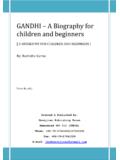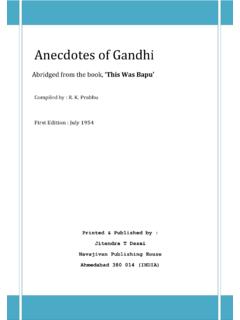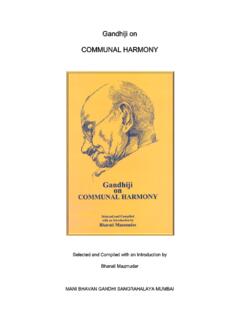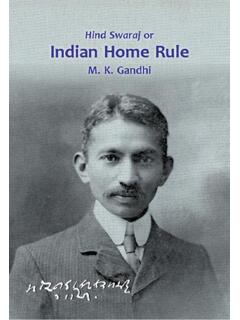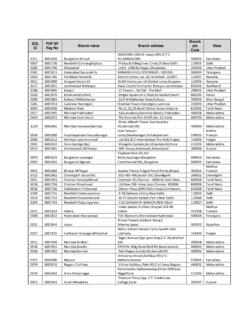Transcription of An Autobiography Or - Mahatma Gandhi
1 An Autobiography Or The Story of My Experiments With Truth By: M. K. Gandhi Translated from the Original in Gujarati by Mahadev Desai General Editor Shriman Narayan Printed & Published by: Navajivan Publishing House Ahmedabad 380 014 (INDIA) An Autobiography or My Experiments with Truth Page 2 FOREWORD Throughout the world, almost all nations will be celebrating from October 2 this year the birth centenary of Mahatma Gandhi who is now universally recognised as the glorious symbol of truth and non-violence. Gandhiji was not only a great national leader who liberated India from foreign domination through a peaceful and bloodless struggle, but also a profound thinker who placed before the world certain eternal principles for the guidance of human relationship and international behaviour.
2 He laid the greatest stresson the purity of the means for the achievement of noble ends. The means may be likened to a seed, the end to a tree; and there is just the same inviolable connection between the means and the end as there is between the seed and the tree. 1 The Mahatma never compromised his adherence to this ideal even for the attainment of Swaraj for India. He was convinced beyond any shadow of doubt that this method of righteousness was, ultimately, the shortest, although it may appear to be long, perhaps too long. 2 To Gandhiji, civilization, in the real sense of the term, consisted not in the multiplication, but in the deliberate and voluntary restriction of wants.
3 3 He always upheld the sublime aim of simple living and high thinking . While he strained every nerve to provide gainful employment to the hungry millions of India through various constructive activities, he underscored the imperative need for raising the standard of life of the people, including the ethical and moral aspects. To him mere affluence and accumulation of material wealth was a primrose path leading to social, economic and cultural disintegration. True economics, affirmed Gandhiji, never militates against the highest ethical standard. An economics that inculcates Mammon worship, and enables the strong to amass wealth at the expense of the weak, is a false and dismal science.
4 4 At a time when a number of developed countries are faced with this tragedy of mere affluence it would be worth our while recollecting Mahatma Gandhi s insistence on higher values for the establishment of a new world order. As a recent editorial in the New Statesman captioned Not By Bread An Autobiography or My Experiments with Truth Page 3 Alone stated, there is evidently a hunger in the world for governments which are activated by moral principles, which take decisions not because they are expedient, but because they are right. 5 There is an erroneous notion that Gandhiji was against the use of modern science and technology and favoured out-dated technniques for some spiritual or sentimental reasons.
5 I would price every invention made for the benefit of all, remarked Gandhiji. Mechanisation is good when the hands are too few for the work intended to be accomplished. It is an evil when there are more hands than required for the work, as is the case in India. 6 Gandhiji was, thus, not against machinery as such, but objected to the craze for machinery and its indiscriminate multiplication . In place of mass production he advocated a system of production by the masses . He clearly envisaged that in a developing country like India, with scarce capital and abundant labour, the physical energies of the masses could be converted into a vast constructive force under a democratic frame-work, which Professor Mumford, in a somewhat different context, terms a megamachine.
6 7 We have to realize without equivocation that the pursuit of material prosperity alone would land us into a blind alley. The modern industrial organisation has given birth to a few giant business corporations which tend to reduce the State to a subservient position and bind it to, what Professor Galbraith calls, a Techno-structure, consisting of specialists, planners and technicians. In order to avoid the perils of such an industrial system, the American economist recommends the strong assertion of other goals , so that the new Industrial State would become responsive to the larger purposes of the society.
7 8 These goals could, doubtless, be essentially human and spiritual in accordance with Gandhiji s ideals and programmes. Mahatma Gandhi was deeply concerned with the welfare of the unprivileged classes in India as well as in other countries. While striving to promote the good of all in a Sarvodayal society, he directed his first care and attention to the needs of the poorest and the lowliest. Ruskin s maxim of Unto This Last was a source of deep inspiration for his life and work. It was this human approach An Autobiography or My Experiments with Truth Page 4 which made Gandhiji an uncompromising crusader against racialism and colonialism.
8 He gave us an unfailing talisman for right action: Whenever you are in doubt, or when the self becomes too much with you, apply the following test: Recall the face of the poorest and the weakest man whom you may have seen, and ask yourself if the step you contemplate is going to be of any use to Then you will find your doubts and self melting away. 9 Gandhiji was a firm believer in the democratic way of life. He maintained that true democracy could be evolved only through non-violence and spontaneous cooperation. The spirit of democracy cannot be imposed from without; it has to come from within.
9 10 He envisioned a world federation raised on the foundations of integrity and mutual respect in international affairs. While he laboured ceaselessly for India s freedom and renaissance, he was averse to isolated independence . He wanted each nation to imbibe the good qualities of others, without losing her own soul or genius. To quote his own classical expression, I do not want my house to be walled in or all sides and my windows to be stuffed; I want the cultures of all the lands to be blown about my house as freely as possible; but I refuse to be blown off my feet by any.
10 11 It is, therefore, quite appropriate that we should suitably celebrate the birth centenary of one who had lived every minute of his life for the good of mankind, and had highlighted some basic prinicples as guide lines for humanity. In the inimitable words of Pandit Nehru, the light that has illumined this country for these many years, will illumine this country for many more years, and a thousand years later, that light will still be seen in this country and the world will see it, and it will give solace to innumerable hearts. For, that light represented something more than the immediate present; it represented the living, eternal truths, reminding us of the right path, drawing us from the error.
